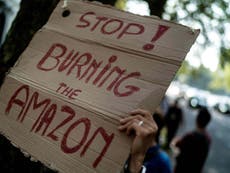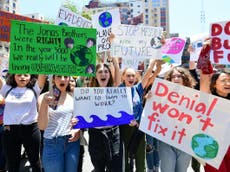Only the rich fly regularly – so now they've got to pay to tackle climate change
A frequent flyer tax would be a popular measure: it means a first family flight would be totally untaxed, offering more people the chance to travel abroad with all the opportunities to learn and explore

David Attenborough called young people’s attitudes towards climate change “a source of great hope” at a recent event in parliament. But he also delivered a stark message.
“We cannot be radical enough in dealing with the issues that face us at the moment. The question is: what is practically possible? How can we take the electorate with us in dealing with these things?”
He picked out cheap flights as a key challenge to reducing the number of air miles flown, but how can we propose to deny people access to low-cost foreign travel and still win an election to implement the policy?
Aviation has long been a thorn in the side of the climate movement. Flying is a fact of modern life and yet it has a greater impact on the climate than almost anything else an individual can do. It’s not just that large volumes of fossil fuels are needed to get a plane in the air, but once it’s up, many of those emissions are released high in the atmosphere where they do even more damage.
Like Trump’s view on the NHS in a US trade deal, no one has known whether aviation is on or off the table in climate considerations. The ambiguity on aviation baked into the original Climate Change Act should finally have been cleared up when the Committee on Climate Change Net Zero report stated that “emissions from international aviation and shipping cannot be ignored”.
However the Conservative government did indeed ignore this advice. It said instead it would work with international agencies like the ICAO, rather than taking a lead.
The aviation sector has made some efficiency improvements but much like the oil and gas lobby, they’ve yet to take the issue seriously. They should be wary – the now defunct coal power lobby spent years spinning a yarn about carbon capture and storage without doing much to implement the technology. Now they’re political pariahs with stranded assets.
Technologically there are some options – batteries right now are too heavy, but would be the ultimate solution if energy density issues could be worked out. Hydrogen or biofuels present possible options but both come with challenges and early action is needed.
One well-considered solution proposed by the New Economics Foundation is a frequent flyer tax. This stems from the realisation that 70 per cent of flights are taken by the wealthiest 15 per cent in society. Over half of the UK population doesn’t fly at all, predominantly because they don’t have the economic means to. This suggests a very skewed system where the poorest barely fly at all whilst the richest fly frequently releasing greenhouses gasses that impact us all.
The frequent flyer tax solution, which I endorse and I think the Labour Party should too, would mean the removal of some current taxes on flights and the implementation instead of a tax which increases for every flight you take in a 12 month period.
This should be a popular measure as the first flight would be untaxed, making it cheaper for the majority of the population who either fly once or never, and makes it more likely that the average family has a greater chance to travel abroad with all the opportunities to learn and explore that brings.
However, the second flight will incur a greater tax than the current tax system and it will keep growing for each flight taken. A larger tax will apply to longer flights helping keep the tax reflective of real-world impact and hopefully reducing the total number of flights taken.
By far the majority of flights are taken by those who fly 20, 30 or 50 times a year, and it will be them (or their businesses) who would face this significant tax as a disincentive from doing so. Some business flights are entirely necessary, but I am certain some are not.
By linking the tax to a passport number it will be easy to make sure everyone is paying the right level, and that those who are making the most pollution are paying the most taxes. This new tax should also be combined with an incentive for businesses to install internet calling and conferencing services to help facilitate meetings with staff based overseas.
The frequent flyer tax should underpin a National Aviation Emissions Plan which reduces emissions year on year and reinvests tax receipts in research into new fuels and propulsion in aviation as well as on improved rail infrastructure.
In the longer term, solutions will likely arrive through science and innovation as low carbon heavy industries develop alternative clean fuels, electric planes and the overall reduction in flying through advanced communications technology.
I want to see the frequent flyer tax in the next Labour manifesto if we are to show we are serious about reducing aviation emissions. It’s time for the industry to stop flying below the radar on climate change and get it’s low carbon ambitions off the ground.
Alex Sobel is the Labour and Co-operative MP for Leeds North West. He sits on the executive committee of SERA, Labour’s environment campaign group.






Join our commenting forum
Join thought-provoking conversations, follow other Independent readers and see their replies